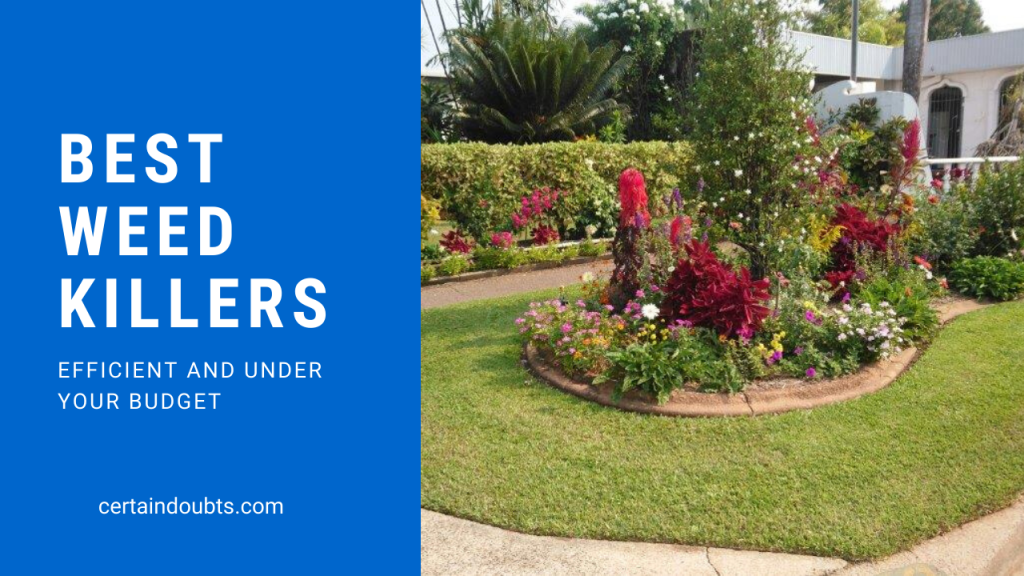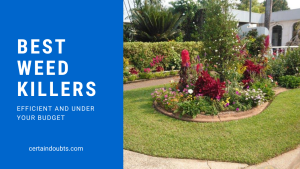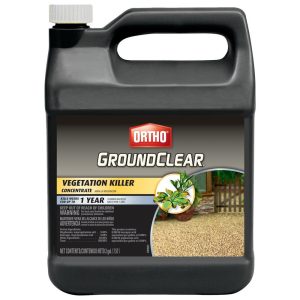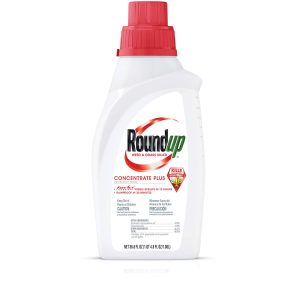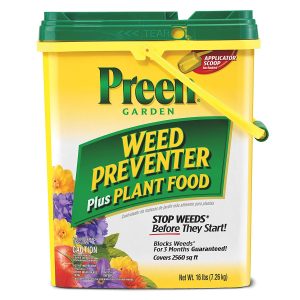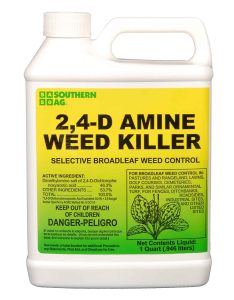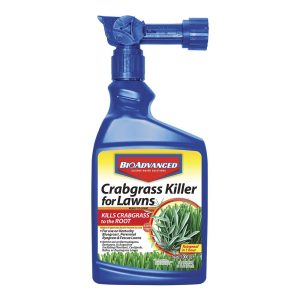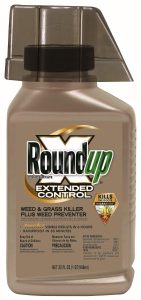Looking for the best weed killers in the market? In this article, we tell you about our top picks along with a comprehensive buyer’s guide for your reference.
Weeds are a beautifully manicured lawn’s biggest enemy. They’re just like those guests who show up unannounced, every so often. These plants can grow in any place, from cracks in footpaths to the edges of gutters to the perimeters of highways to your lawns.
How & Where Do Weeds Grow?
Weed seeds are dispersed all around, in abundance. They can spread very quickly and live a long long time. And, they’re always sitting tight to crop up when the conditions are most conducive to their growth. Its hard to define a single best condition for weeds to grow because there are over 2,50,000 species of weeds! That said, some of the best conditions include hard/compacted soil, shady places, sunshiny areas, wet/loose soil, places where the grass has undergone thinning, and places that have a lot of on-foot human traffic.
Why Do We Need to Get Rid of Weeds?
All that hate, what for? Firstly, they are unattractive. After all the effort you put into keeping the grass and the flowering plants healthy in your lawn, you don’t want weeds to destroy its aesthetics, do you?
Not only are they ugly, but also dangerous to a certain extent. This is because weeds compete with other plants in your garden for important resources such as soil, sunlight, water, and other nutrients.
Had the instances of weed growth been sparse, it may not have been such a huge problem. But as we mentioned earlier, weeds grow everywhere; and that can be quite intrusive!
What do you do then?
Well, if you have a small space and don’t want to invest, then by all means go ahead and pull them out, the traditional way. But I don’t think you’re here for that. So don’t worry. We have done the homework for you and sifted out the best weed killers available in the market.
Our List of the Top Weed Killers for 2020
After much research, we have gathered a list of the best weed killers available in the market today. Take a look:
1. Compare-N-Save Concentrate Grass & Weed Killer:
This weed killer seems to be everyone’s favorite, and it isn’t hard to tell why. It is one of the most effective weed killers that targets a wide variety of weeds and grasses (annual & perennial). Compare-N-Save is a non-selective (contact & systemic) post-emergent weed killer, meaning that it will kill everything that it comes in contact with, without any distinction. Though it is mighty powerful, you must be careful while applying this weed killer, especially when spot spraying, since it can target almost every plant. It is highly concentrated in the herbicide glyphosate (41%) thereby inhibiting the weeds from composing proteins required for its growth. High concentration also means that you would be saving a lot of money since you can make up to 85 gallons of mix with just 1 gallon of the concentrate.
Once applied, the weeds should be dead within 2 weeks with the process starting in as few as 2-4 days. This weed killer attacks the weeds not just from above the ground but also down to the roots. You can avail compare-n-save in either 32 oz. (covers 6,300 sq. ft), 1 gallon (covers 25,500 sq. ft), or 2.5 gallons (covers 63,000 sq. ft). If you are looking for something that is effective, yet affordable, this should be your top pick.
2. Ortho GroundClear Vegetation Killer Concentrate:
Another concentrated weed killer, Ortho GroundClear does justice to its name in that it is non-selective and therefore, will attack all types of vegetation. Much like Compare-N-Save, it will kill the weeds not only from ground up, but will also destroy the roots. The Ortho GroundClear weed killer can be applied for both, pre-emergent and post-emergent weeds. It has got two main active herbicides namely, Glyphosate (5%) and Imazapyr (0.08%). These ingredients ensure the prevention of weed growth for longer periods of time, i.e. up to one year or more.
You can get this weed killer in 32 oz., 1 gallon, and 2 gallon variants which cover 75 sq. ft, 300 sq. ft, and 600 sq. ft respectively. This weed killer is best for getting rid of weeds in patios, crevices in driveways/sidewalks, fence lines, and gravel areas. It isn’t the best option if you want to cover large areas such as lawns since it has limited coverage and would kill all the surrounding plants including flowers and vegetables. Another downside is that it is a bit expensive. However, given that you need not apply the product more than twice in a year, the price isn’t really a deal breaker.
3. Roundup Weed & Grass Killer Concentrate Plus:
Much like Compare-N-Save, the Roundup Weed & Grass killer concentrate plus is also a non-selective (contact & systemic), post-emergent weed killer which attacks grasses, weeds, flowers, and any plant that it comes in contact with. However, it is slightly different in terms of its composition. It is made up of two main active ingredients namely, Glyphosate (18%) and Diquat (0.73%). That said, it is very efficient in killing the weeds from both, above and underneath the ground. You will be able to see visible results in just 12 hours, and complete death within 1-2 weeks, thanks to its FastAct technology. To boot, it becomes rainproof in under 30 minutes.
You can get Roundup Weed & Grass Killer concentrate plus in 16 oz., 36.8 oz., and 64 oz. variants. These cover 1500 sq. ft, 3000 sq. ft, or 6,000 sq. ft respectively. In case you’re planning on getting one to do away with all the weeds on your lawn, even the 16 oz. bottle should be sufficient as it can give you about 10 gallons of mix. Go for the other variants if you need more concentrate right from the beginning.
You can apply this weed killer simply by mixing the amount of concentrate you need, along with water, and spraying it carefully only where you want the vegetation to be gone. In case you get some of it on the soil, don’t panic because this weed killer doesn’t spread to other areas.
In case you are confused between Compare-N-Save and Roundup Concentrate Plus, we’ll make it easier for you to decide. While the former is quite effective and highly affordable, the latter is a better brand (more expensive) and quicker in action.
4. Preen Garden Weed Preventer:
As the name suggests, Preen Garden Weed Preventer is a great option if you’re looking for a pre-emergent weed killer, since it thwarts the weeds from growing right at their source. Basically, it destroys the weeds even before they begin to germinate and ruin your life. This weed killer prevents as many as 27 types of broadleaf weeds and grasses from growing while safeguarding more than 200 types of trees, flowering plants, bulbs, shrubs, and vegetables.
In order to get the most out of Preen Garden Weed Preventer, you must first pluck out the existing weeds from your garden, and then apply the weed killer. This killer comes with a power spreader cap, which makes it quite easy to apply the granules. Preen says that you should reapply this weed killer every 9-12 weeks to clinch on a garden sans weeds.
You can choose from various different sizes which cover lawns ranging from 900 sq. ft to 5000 sq. ft. Preen Garden Weed Preventer is perhaps one of the best pre-emergent killers out there which is ideal for an established lawn/garden. Though it may be a bit expensive compared to other similar products, it is definitely worth it.
5. Southern Ag 24-D Amine:
If you’re looking to exterminate broadleaf weeds like poison ivy, dandelions, clover, and chickweed, sans any damage to other grasses, then Southern Ag Amine is your best bet! This weed killer is a selective (contact), post-emergent type that is available in a package of 32 oz of effective, yet mild concentrate that kills weeds within just a few days. All you have to do is mix 2-3 tablespoons of the concentrate with about 3-5 gallons of water. This will give you a coverage of roughly 20,000 sq feet. In case you notice that the weeds are still popping up, you can increase the amount of concentrate in your next mix.
Unlike a few other selective herbicides which still destroy some grasses, the Southern Ag 2 does not harm any types of grasses, including the St. Augustine grass. Moreover, you get a huge coverage with a tiny amount of concentrate. Lastly, this product is reasonably priced. In case you have an established lawn that is infested with weeds, this is presently one of the best selective weed killers out there.
6. Bayer Advanced Lawn Weed & Crabgrass Killer:
Bayer Advanced Weed & Crabgrass killer is yet another selective (contact & systemic), post-emergent type weed killer that targets roughly 200 types of weeds including crabgrass, dandelions, clover, nutgrass, and more. It comes in a 32 oz concentrate bottle comprising of 1.61% Quinclorac (kills crabgrass), 4.85% 2,4D, and 0.45% Dicamba. This product does not only attack the weeds from above the ground but also penetrates into the root system, while keeping the rest of your lawn safe.
If you mix about 3.2 oz with a gallon of water, it’ll give you a coverage of up to 5,000 sq. ft of lawn. The product turns rainproof within just an hour.
While Bayer advanced weed & crabgrass killer is great for attacking crabgrass, it may not be the most ideal selective weed killer as it may also kill the very popular, St. Augustine grass. However, if you don’t have the said grass in your garden, then this is perhaps the best weed killer for mainly targeting crabgrass.
If you want a pre and post emergent weed killer, you could also check out the Bayer Season Long Weed control variant which lasts up to 6 months after the first application.
7. Roundup Control Weed & Grass Killer:
In case you’re not aware, Roundup is one of the most esteemed and long-standing brands that makes herbicides. They offer a massive range of products for killing weeds. If mixing concentrates with gallons of water or buying a sprayer separately sounds too troublesome to you, then this particular product is worth considering. You can apply it directly, as per the instructions on the product.
Unlike many other weed killers, the Roundup Control Weed & Grass Killer boasts of a dual action formula, which works not only as a post-emergent killer targets but also as a pre-emergent killer (preventing new weed growth). This product restricts weed growth for as long as 4 months.
That said, the ready-to-use convenience aspect is also a con in that you do not get just the concentrate. Therefore, you get a coverage of only 400 sq. ft with 1.3-gallon bottle of the pre-mixed product. This can turn out to be quite expensive. However, if convenience is a priority, then do give this one a go.
Buyer’s Guide for Weed Killers:
Before we move onto our products list, we’d highly recommend that you go through our buyer’s guide to get a better understanding of which weed killer to pick.
Here are a few aspects to keep in mind before making your purchase:
1. Selectivity:
When it comes to weed killers, two terms are used very commonly. Selective and Non-selective. Selective weed killers attack only certain type of weeds like dandelions, woody, and broadleaf plants. These killers do not target all types of plantation; which means that the grass in your lawn will remain unharmed. Selective weed killers are ideal for lawns which have already been set up. Note that certain selective herbicides do kill some types of grasses such as St. Augustine grass. Therefore, its a good idea to check the labels before purchasing.
Non-selective weed killers on the other hand, attack all types of plantation that it comes in contact with. This includes grasses, flowers, vegetables, trees, and other healthy plants. These type of weed killers are best for lawns with thinning grass and an excessive growth of weeds everywhere. You can also use them if you want to get rid of grass and weeds growing by the side of your driveway, inside crevices of concrete, or amidst paving slabs. That said, make sure that you use non-selective killers with some caution because they can destroy the neighboring trees and plants.
2. Emergence:
As far as emergence is concerned, we generally refer to two types of weed killer – pre-emergent & post-emergent. Pre-emergent weed killers are used to prevent the growth of weed by applying them before germination; whereas post-emergent weed killers are those which are applied to plant leaves and are meant to kill weeds that have germinated already. Post-emergent weed killers can be either system or contact.
3. Systemic vs Contact:
Perennial weeds such as bindweed, poison ivy, dandelion, thistle, and ragweed, usually grow by means of seeds and roots which spread in abundance. Systematic weed killers permeate the leaves and then the roots. This not only hinders the weed from growing right from underneath the soil, but also impedes photosynthesis. Hence, these weed killers are best for perennial weeds. Although systematic weed killers work a bit slowly, with results showing in about 1-3 weeks, they ensure complete weed death.
Contact weed killers on the other hand, target only the weeds that it comes in contact with. These weed killers act quite quickly in that the weeds generally die in 1-2 weeks. Therefore, they are ideal for killing annual weeds.
4. Type of Weed:
A broad-spectrum weed killer is sometimes incapable of targeting all types of weeds. That’s why, its good to know more about the species of weed that are invading your lawn and the premises of your house. Try and find out the conditions and seasons in which they germinate. More the research you do, the better suited your weed killer purchase would be. This will be of even greater help if you’re planning to get a pre-emergent weed killer.
5. Persistence:
As the term suggests, persistence refers to the weed killer’s potential to stay potent since its application on the weeds. Persistent killers are those which forestall regrowth. These killers should only be used in those places where you’re certain that no plants would grow. Non-persistent killers remain potent for a few weeks to a few months. Therefore, they need to be reapplied occasionally.
6. Price:
Pricing structures of weed killers are slightly complex. It will greatly depend upon whether the weed killer is ready-to-use or concentrated. In order to compare the prices between the two, you need to first calculate the price of ready-to-use weed killers according to cost per gallon. Then, to calculate the price of concentrated weed killers, you need to work out the cost of concentrate as per the number of gallons of product that has been diluted. This amount then need to be compared to the amount of ready-to-use killers.
To get the maximum number of applications using concentrated weed killers, its best to dilute the concentrate by adding sufficient amount of water. Note that you’ll need to buy a sprayer separately (costs anywhere between $10-$25). For ready-to-use killers, you do not need to dilute the chemical. These killers come with sprayers so you wouldn’t need to invest in one separately.
Concentrated weed killers may cost you about $3 to $10 per gallon after dilution whereas ready-to-use weed killers can cost you approximately $8 to $20 per gallon. Concentrated weed killers can also come in the form of powder and granular killers which may cost roughly $5 to $12 per square feet of lawn.
Concentrated weed killers are best for targeting a large area filled with weeds as they are a lot more effective. On the other hand, ready-to-use weed killers are the most ideal for small areas with scattered weed growth.
Wrapping Up:
We earnestly hope that our list will help you buy the right weed killer for your lawn and house premise. Though we have listed all of our top picks above, we’d like to mention a few noteworthy weed killers that you may want to look up online. Those are – RM 43 Glyphosate Plus Weed Preventer (one of the best pre-emergent weed killers), Spectracide Weed & Grass Killer (perhaps the best non-selective weed killer), and Scotts Halts Crabgrass & Grassy Weed Preventer (a good selective, systemic, & pre-emergent weed killer).
Note that while the weed killers mentioned above are all quite potent, it is extremely important to be careful while using/applying them. Do not forget to read the instructions which come along with the product packaging in order to use the chemicals safely and get the best possible results.

